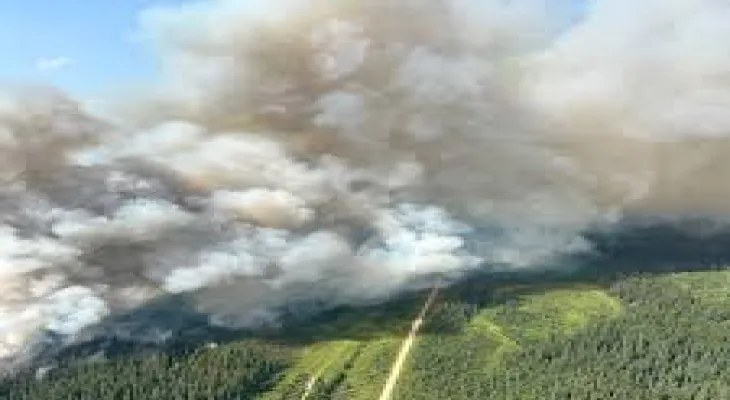Search here
Newspaper
Search here

Arab Canada News
News

Published: August 11, 2024
The evacuation order issued for some areas south of Valemount, British Columbia, was downgraded to an evacuation alert earlier on Saturday evening, meaning residents can return to their homes but must be prepared to leave on short notice.
According to the 2021 Census, the Valemount community, located about 260 kilometers southeast of Prince George, British Columbia, is home to approximately 1,000 people.
On Saturday evening, a wildfire on Canoe Road – which is burning less than five kilometers from the village – prompted the Fraser Fort George Regional District and the village of Valemount to issue the order.
The new evacuation alert covers properties east of Wiskiswell Road, south of Cedarside Road, and the northern end of Kinbasket Lake.
BC Wildfire Services (BCWS) stated that ground crews are battling wildfires, alongside Valemount Fire Department personnel, supported by airtankers and helicopters.
Valemount Mayor Owen Torgerson told CBC News on Saturday evening, "Wildfire and local resources in British Columbia, [like] Valemount Volunteer Fire and Rescue, have been deployed quickly knowing how fast they can flare up."
"So, we tip our hats to the first responders for chasing them down immediately."
As of Saturday night, the fire, designated G32044 on the BC Wildfire Service dashboard, was less than one square kilometer in size.
Over 400 fires burning
According to BCWS, there are more than 400 wildfires burning across British Columbia as of Saturday evening.
In a report released on Saturday, the service states that the hot, dry weather coupled with lightning activity is fueling new wildfire outbreaks and may intensify existing fires.
The service predicts a significant chance of lightning in the southern interior on Saturday afternoon.
It states that over 1,700 individuals are responding to fires across British Columbia, with more than 260 fires reported extinguished in the previous seven days up until Saturday morning.
BCWS Fire Information Officer Sarah Budd told CBC News on Friday that August is typically the most active month for wildfires in British Columbia.
Environment Canada issued several heat warnings for areas in the interior of British Columbia, as well as for Fort Nelson in the northeast.
According to the service, the majority of active wildfires in the province are caused by lightning. Budd said that the wildfire service expects that small fires ignited by lightning, which may not yet be detectable, will become visible as humidity continues to drop.
"You might see a lightning strike. Then the fire will smolder slowly, and with the rising temperatures and dryness – often, it’s the winds that do it – this would really ignite such fires." "When we get more oxygen into the fire, these fires emerge and become visible to our sight."
Environment Canada issued thunderstorm warnings for several areas of the province on Saturday, including Fraser Canyon, South Thompson, Similkameen, and Nicola.
Philippe Allan Bergeron, a meteorologist with Environment and Climate Change Canada, stated that he expects the hot and dry weather to continue through the weekend before temperatures across the province return to seasonal averages early next week.
He added, "These temperatures will remain warm summer temperatures, but much closer to normal levels."
While some parts of the province may see light rain next week, Bergeron said it would be very localized.
He also mentioned that wildfires are causing smoky skies across much of the province.
Evacuation order issued west of Quesnel
In the Cariboo Regional District of central British Columbia, local authorities ordered residents of 30 properties in the Quesnel Lake area, west of the city of Quesnel, to evacuate the area immediately on Friday night.
Three out-of-control wildfires nearby – all suspected to be caused by lightning – prompted the regional district to issue the order on Friday "due to the immediate danger to life."
An evacuation alert was also issued for 28 properties in the surrounding area, covering more than 880 square kilometers.
There is a ban on campfire use in most of British Columbia.
The hot and dry weather has led BCWS to reinstate its ban on campfires in northwestern British Columbia as of Saturday noon.
Campfires remain prohibited across the province, except for a fire center in Prince George that covers the central and northeastern parts of British Columbia.
According to the Canadian Ministry of Natural Resources, human-caused climate change means that hot and dry weather is occurring more frequently, leading to the drying of vegetation that fuels wildfires and creating conditions in which they thrive.
Researchers also expect that climate change will lead to an increase in lightning in the province, which may result in more fires igniting.
Comments